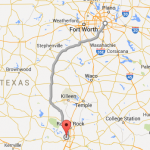 When it came time to head home to Dallas for the Easter weekend, I made the easy decision to take scenic Highway 281 instead of dreaded I-35. For me, trading in concrete and construction for bluebonnets and an open road was a no-brainer, even if it meant adding thirty minutes to my drive.
When it came time to head home to Dallas for the Easter weekend, I made the easy decision to take scenic Highway 281 instead of dreaded I-35. For me, trading in concrete and construction for bluebonnets and an open road was a no-brainer, even if it meant adding thirty minutes to my drive.
As I drove through the hill country, the images of so many of my favorite “Texas Country” songs filled the windshield: ranches, back roads, and a Texas-sized sunset. Seeing all of this made me wonder if any of the great Texas artists got their start along this stretch of highway, or if they just used the popular hill country scenery as inspiration for their songs.
Once I got home, I researched each town along the route, including those on connecting Highway 67, to see if any notable country music stars had their roots planted there. After striking out in Lampasas, Hamilton, Glen Rose, and other towns along the way, I was pleasantly surprised to discover that one of my favorite country artists was born and raised in Cleburne, TX. Randy Rogers, lead vocalist and namesake for the Randy Rogers Band, built his musical foundation in the town of about 20,000 people.
Even though the Randy Rogers Band has been a favorite of mine for a few years now, I knew little about the background of the band and how their life stories helped develop the songs they sang. Growing up, Rogers said he took the country music direction simply because the lyrics he wrote and the twang in his voice fit best in the genre. Combined with his guitar playing, which he started at the age of 11 or 12, Randy Rogers and his music encompass the true definition of Texas Country.
While a lot of artists claim to be Texas country, Rogers’ small town Texas roots give him the authenticity to back up his claim. In a 2010 interview, he touched on some of the topics that are most debated in this class, especially the tension between Nashville and Texas Country. In this interview, I believe Rogers explains the divide clearer than anyone else I have heard. While he argues that Texans are proud and admittedly cocky, he says this really does not factor into the standoff with Nashville. And while Texas country bands might tour more days out of the year than those from Nashville, he says this does not affect the divide too much either. According to Rogers, people make blind generalizations that blow the split out of proportion and stray from the truth.
While many artists that associate themselves with the Texas Country movement might have similarities including lyrical topics, instrumental accompaniments, or even merely large levels of Texas pride, Rogers argues that for these similarities, there are just as many differences. He believes that there is great and equally as varying music coming from Texas and Nashville. Some artists in Texas are adopting more of a Nashville feel and vice versa. For Rogers, he is proud to be a Texan for whatever people decide that means. In addition, this simple feature of variety within the genre is why he believes country music is so great. According to him, country music has always rocked from its balancing point thanks to people that push the boundary, but somehow it always finds its way back onto it’s path.

I really enjoyed the imagery you included in the first paragraph. I was able to visualize my hometown because it is similar to the towns you passed through. I am from a small town of about 25,000 people, so I can relate to Randy Rogers on a personal level and that makes me like him even more. It seems as if other artists in other genres do not have the same humble roots as many country music artists. It is also interesting that Randy Rogers redefines the idea of Texas country. We have discussed this idea many times in class, and it’s ironic that a true Texas country artist does not really acknowledge the subgenre as being legit and widely adopted. I think he is right about his views on country. Every artist or band is different in some way and they should have the freedom to explore what country means to them.